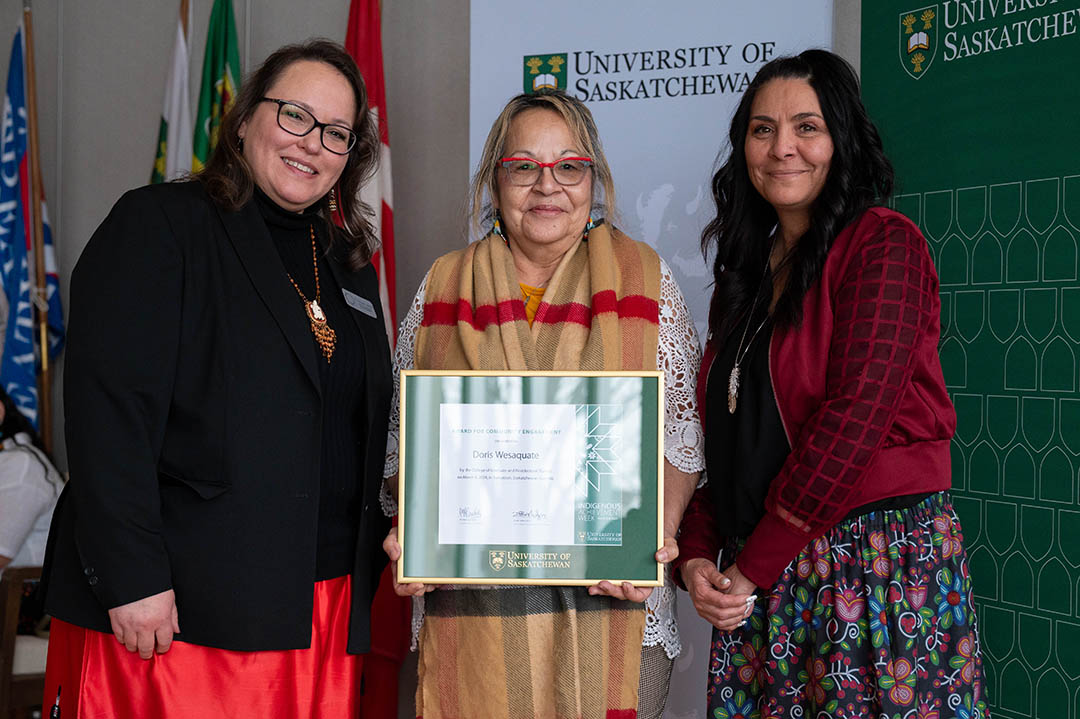
Life-long learner’s motto to ‘love one another’ serves her well
Doris Wesaquate is many things: a kinesiology PhD student, grandmother of 17, mother of four, and a daughter, among others. Now she is also an Indigenous Student Achievement Award winner at the University of Saskatchewan (USask).
By John Shelling and Elisabeth BaumanWesaquate has been involved in post-secondary education since the mid-1980s and is motivated by her desire to tell Indigenous healing stories. She says she hopes to do this by becoming a “once-published author, to become an expert using technology, and to create a blog, or become a TV host, or to vlog.”
For her efforts in community engagement, Wesaquate received an award at this year’s Indigenous Student Achievement Awards (ISAA), which took place on March 6. Indigenous students from across the university were honoured at a ceremony to recognize their academic excellence, community engagement, leadership, research endeavours, or resiliency.
The ISAA is part of Indigenous Achievement Week (IAW) which celebrates the successes and contributions of Métis, First Nations and Inuit students, staff and faculty at USask.
We asked Wesaquate a few questions about her time at USask and what motivates her.
Is there someone in your life who inspired you to get where you are today?
I completed the MEd in Adult Ed Foundations in 2018 and my (now deceased) partner was my greatest supporter and fan throughout. He came up with the idea to get the letters behind my name. As he whole-heartedly believed in my potential to be Dr. Doris Wesaquate, PhD.
My inspiration originates across time and spaces from former Indigenous university instructors, authors, students at the NEIHR Gathering (2022), the on-campus helpers, Elders, and advisory members.
If you were to give a first-year undergraduate student advice about attending post-secondary school, what would you tell them?
Overcome the fears, the what-ifs, and chase your dreams no matter how long it takes! There are many supports if you need them. Be honest about your challenges and tell your truths even if it hurts. We are all a work in progress. Find a good therapist and build a few trusting relationships who will help you when you really need them. Never be shy to heal or to share your story. We all need healing! Never compare or complain. Erase the bad with the good, and prayer does work. Think good thoughts to rid of negativity. Connect with your instructors, they are resourceful. Get into your student rep office and ask questions.
You are involved in a lot: you are a mother, grandmother, and a student. How do you balance everything?
Balance for me required having to do “real” self-care, rest and relaxation often, and the transition to living alone to reduce my stress. Working online due to low-energy levels and having a therapist for on-call support has been a blessing in disguise.
You are receiving the award for community engagement. Why is community important to you?
The Indigenous communities need development. While students are a great resource to implement ideas, they have initiative. Therefore, this idea around community capacity building and networking for the future is viable for healthier communities. Physical, social, emotional, and mental health team developments are urgently overdue. These voices, the networks and the engagement opportunities in First Nations communities are a natural, untapped, keeper of all types of knowledge. The stories must be told, heard, and documented, as a way, to keep the historical content, impacts and the oral record of each community alive forever.
How does the theme “love one another” (sah-kee-he-took) that your father taught you affect your life and your success?
"Love one another" when translated into Cree you say "Sahkihitok.” My dad said it to me, and all my siblings quite often. I think he intended for us to promote kinship and good relationships between ourselves and others. The values ascribed to the word Sahkihitok means so much more to me because of my dad saying it. So, I make its meaning to be more of having or showing respect, gratitude, humility and acknowledging another, and caring, sharing, helping others in a good way. So that’s been my style across and through the past decades of grad school at least.
What has been most impactful in the support your mentors, knowledge keepers, and advisors have provided you?
The most impactful moments to date have been the NEIHR Indigenous student gathering. That was the most rewarding and satisfying experience yet. The sense of just knowing we are not alone! I felt Indigenous students now have a place to fit in, belong, and to support one another, or to just network with one another across Canada. These are the most inspirational and motivational ideas for validation.
Is there anything else you’d like to share?
Thanks to USask for their Indigenous Strategy, their academic vision and for supporting the Truth and Reconciliation efforts.
